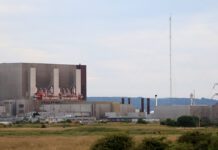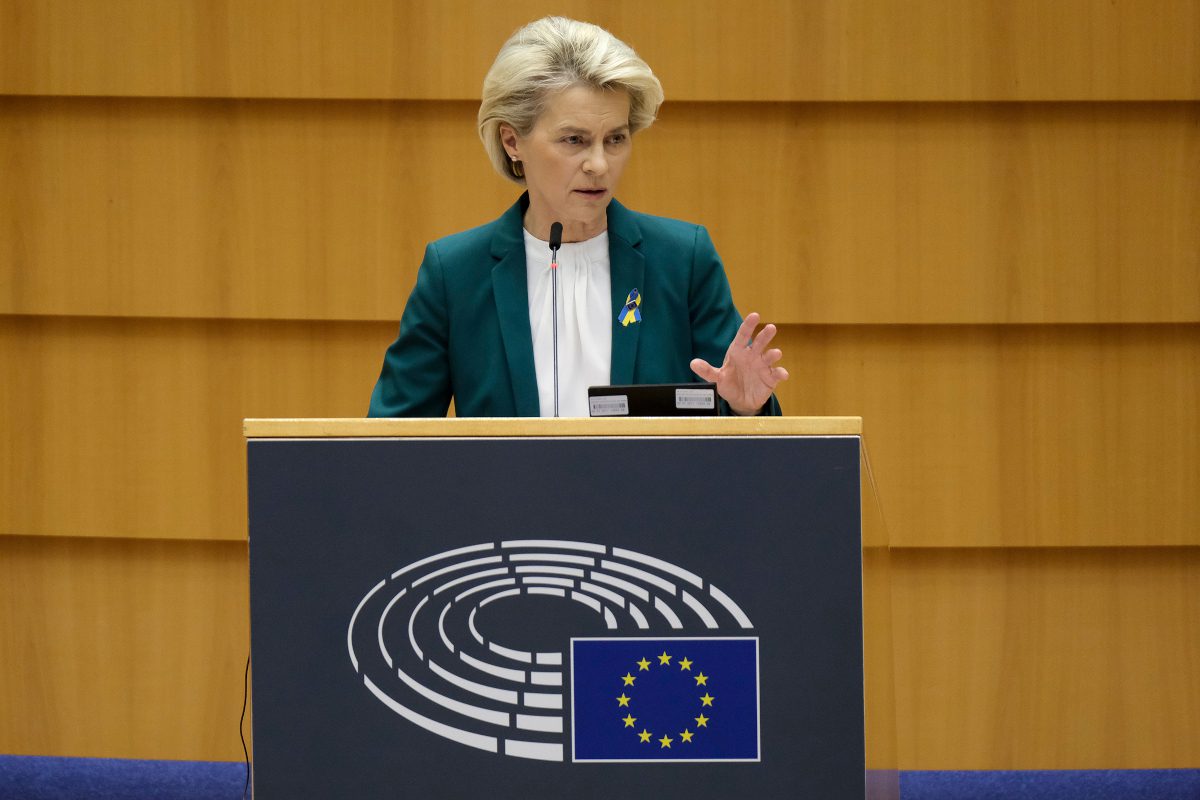
How are European policymakers dealing with the energy crisis? On behalf of environmental group RePlanet, energy specialist Joris van Dorp offers a deep analysis of the key messages in Europe’s policy.
It was a strong call to action in response to the multiple threats and opportunities faced by Europe. In her State of the European Union Address, European Commission President Ursula von der Leyen talked at length about the horror and outrage of the Russo-Ukrainian war, discussing the shortages of food and energy sending shockwaves across the world.
Since these issues are so important, it’s worthwhile addressing some of the key messages of this historic speech, as these will serve as the basis for EU policy in the years ahead.
Skimming off windfall profits
Von der Leyen announced a plan to collect up to 140 billion euros in windfall profit taxes from energy companies that produce electricity at low cost, e.g. wind, solar, hydro and nuclear. She also called on highly profitable fossil fuel companies to offer a crisis contribution, because, as she says, ‘profits must be shared and channelled to those who need it the most.’
While this idea may gain sympathy, it’s unclear how exactly all these taxes and contributions will be legislated. Earlier this month, EU Commissioner Frans Timmermans told a leading Dutch newspaper this shouldn’t be too difficult: ‘You just go to energy companies and say, Show me your books, where is your profit? Then, you skim it off.’
Will it really be that simple?
Currently, governments cannot simply ‘skim off’ company profits. Already, lawyers are pointing out this is not legal. Also, electricity companies aren’t likely to be generous. For much of the past decade, they have barely been breaking even as energy prices have been at historic lows.
And so, it remains to be seen how much money – if any – can be raised.
The words of von der Leyen and Timmermans might turn out to be nothing more than mere political rhetoric – a prelude to blaming energy companies for seeking maximum profits during a crisis while they did their best to serve the common good. It appears our politicians in Brussels have no actual solutions and seem unwilling to admit to it.
Electricity markets reform
In her State of the European Union Address, von der Leyen mentioned that electricity markets are ‘not doing justice to consumers’. After all, consumer prices have become much higher than the cost of producing wind and solar power.
She refers specifically to the merit-order system of electricity trading. This system, in use since the start of the liberalisation of electricity markets in the 1990s, works as a continuous auction, ensuring that electricity sources with the lowest cost of production are used to meet demand first. All suppliers bidding in this auction get paid the same price, namely the price that balances demand and supply. The difference between prices and costs is available for companies to cover their fixed costs (i.e. maintenance and replacement) and to provide investor returns.

As long as there are enough suppliers (such as renewables and nuclear) with low marginal costs, the price paid for electricity by consumers also remains low. But as soon as demand outstrips the capacity of these low-cost producers, prices jump to the price bid by gas-fired generators, which depends largely on the price of natural gas.
Since the price of gas has shot up tenfold as a result of sanctions, along with Russia withholding supplies, any time gas-fired generators are needed to meet demand, prices will jump to the staggering levels we see today across Europe.
Moreover, due to the premature shutdown of nuclear plants in Germany, Sweden, France and Switzerland in recent years, a failure to invest in sufficient new low-cost generation, and an unusually large number of nuclear plant outages in France, gas-fired generators are being used much more often this year than in previous years.
Add this all up, and we’re seeing a perfect storm of high energy prices for years to come – unless Russian gas supplies resume. Natural gas imported into the EU by LNG tankers is four times more costly than Russian pipeline gas was, even before the invasion. Today, with demand from the EU exploding, LNG prices have hit record highs, as EU buyers are determined to outbid existing LNG consumers.
Making up for the loss of Russian fossil fuel supply is a mammoth task. The country previously provided over 40% of all natural gas consumed in the EU. Building enough wind and solar farms or nuclear reactors to compensate will take years, if not decades.
Once more, von der Leyen’s statements ring hollow. They do not inspire confidence in the ability of the EU Commission to diagnose and address the root cause of the problem: chronic lack of investment in indigenous European energy supply.
Yes, high energy prices may be unfair to consumers, especially those who already struggle to get by, but what is happening now is supply and demand in a situation of decades of poor energy policy leading to crumbling energy security and a war disrupting supply. We can only expect, or hope, that high prices will help draw much-needed investment into the sector, since economists might be right when they say, ‘The solution to high prices is high prices.’
Denmark vs France
Rather than trying to push down prices or manipulate energy markets, politicians should encourage smart investment in the energy sector. However, it appears that the Commission is missing the point here as well, judging from von der Leyen’s exemplification of ‘our Danish friends’ for their visionary energy policy after the oil crises of the 1970s.
She says, ‘When the oil crisis hit, Denmark started to invest heavily into harnessing the power of the wind.’ In fact, back then, Denmark started investing in coal, becoming almost completely coal-powered within a decade. The country’s investment in wind energy didn’t take off until the late 1990s.

All the while, Denmark has been in a unique position to use wind power. The country is surrounded by ideal offshore wind resources, while being linked to Scandinavian hydropower reserves providing cheap electricity storage and backup, as well as being integrated into the Northern European electric grid with its cheap and liquid electricity market. Despite all these advantages, the nearly 6 million people of Denmark get less than half their electricity from wind, and still have to import 25% of their electricity on an annual basis.
The question remains how the European Commission can expect member states without access to offshore wind, or surplus hydropower for backup, to become independent of fossil fuels using wind energy. After all, wind farms are usually backed up by either hydro power (if available), or gas-fired stations.
If we have to name a European country with a truly exemplary vision on how to secure energy supply, developed in response to the energy crisis of the 1970s, we should look to France.
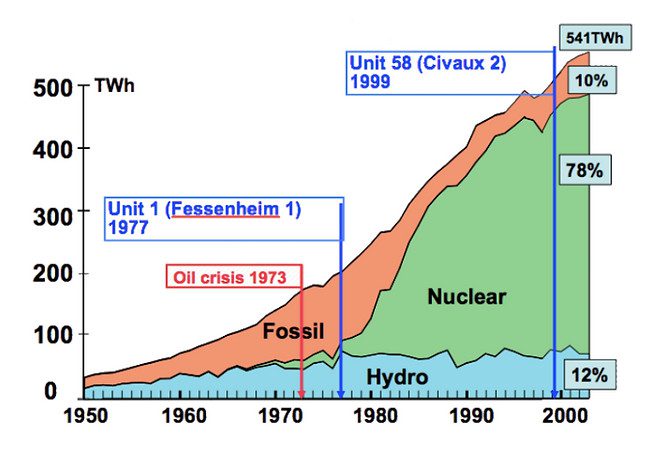
The French responded by launching a plan to build dozens of nuclear power stations. Within 15 years they had all but eliminated their dependence on oil power. By the turn of the century, 90% of their electricity was provided by nuclear and hydropower, making the French grid among the cleanest in Europe, emitting less than one-fourth as much CO2 as Denmark per unit of electricity generated. France became Europe’s largest exporter of electricity.
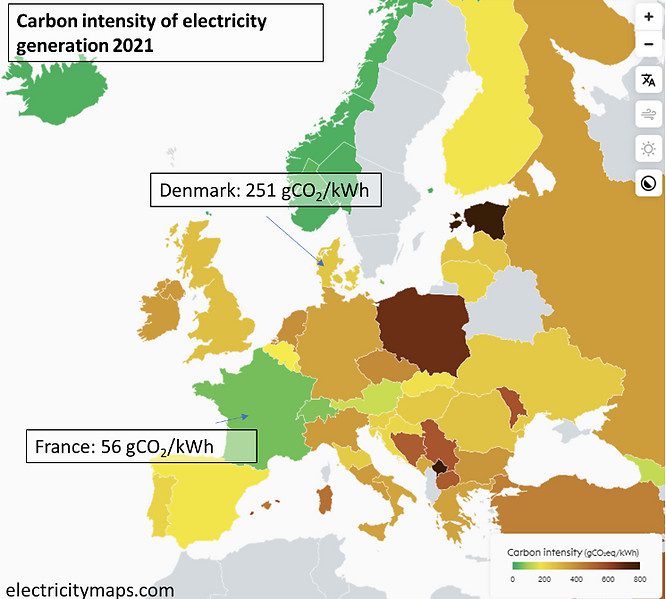
Surely, if energy security and climate change are at the top of the agenda, shouldn’t the European Commission commend ‘our French friends’ for their visionary past?
Nuclear, not coal plants are cheap to run
One reason von der Leyen ignored the French example in favour of the Danes may be that the European Commission appears to be misinformed about basic energy economics. On the day of the State of the European Union Address, the Commission published its proposal for capping electricity prices. The report includes a revealing chart showing the relative marginal costs of energy, according to the Commission. This chart puts the marginal cost of nuclear power at close to the 180 €/MWh price cap, while the marginal cost of coal is less than half of it, and renewables are even cheaper:
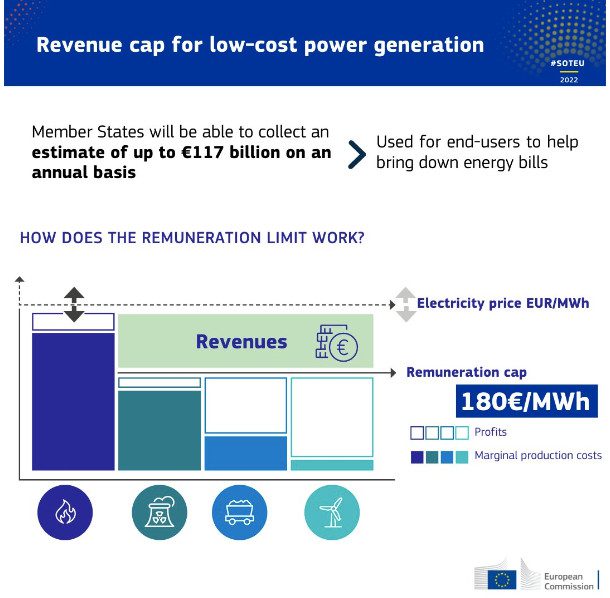
Now, compare the Commission’s chart to the one showing the marginal cost curve displayed earlier in this article. This one reveals nuclear – not coal – to have lower marginal costs. In fact, the marginal cost of nuclear power is nearly zero because reactors are refuelled not when the fuel is depleted, but on a calendar schedule. The cost of nuclear fuel is simply too slight (about 5 €/MWh) to justify variable refuelling schedules.
In other words, no money is saved by ramping down a nuclear power plant, as opposed to a fossil-fuelled plant.
Anyone looking at the European Commission’s flawed chart can be forgiven for thinking that nuclear energy is wildly expensive, while coal and wind energy are cheap. Could this explain why von der Leyen exemplified the Danish wind energy programme rather than the French nuclear programme? Could it explain why the Commission is investing exclusively in renewable energies through the 300 billion euro REPowerEU recovery plan (partly intended to reduce reliance on Russian energy imports), but not spending a penny on nuclear energy?
After von der Leyen’s speech, a number of members of the European Parliament lamented the unmentioned fact that Europe has simply failed to invest enough in its own energy supplies. Some specifically blamed Europe’s narrow focus on renewables and its widespread opposition to nuclear energy. Germany was singled out for being inconsistent by Manfred Weber, who heads the European People’s Party Group. Weber points out that German politicians have pushed hard to shut down nuclear power plants for political reasons during an energy and climate crisis, while asking the Netherlands to re-open its problematic Groningen natural gas field. His comment was met with applause.
The State of the European Union Address, and the responses to it, help shed light on the flawed thinking of policymakers. We hope the European Commission will come to its senses and act promptly to help secure energy supply, and ultimately bring down prices.
Joris van Dorp is a Netherlands-based energy and sustainability consulting engineer, and energy adviser to RePlanet Nederland. RePlanet is a global citizens movement which supports science-led solutions to the climate and nature crisis.




